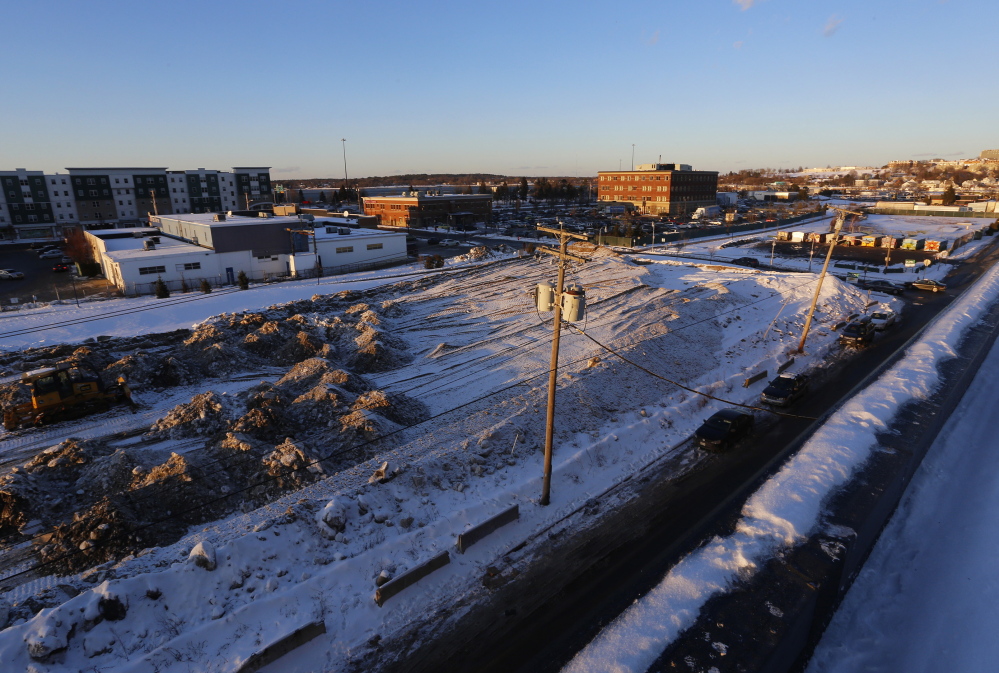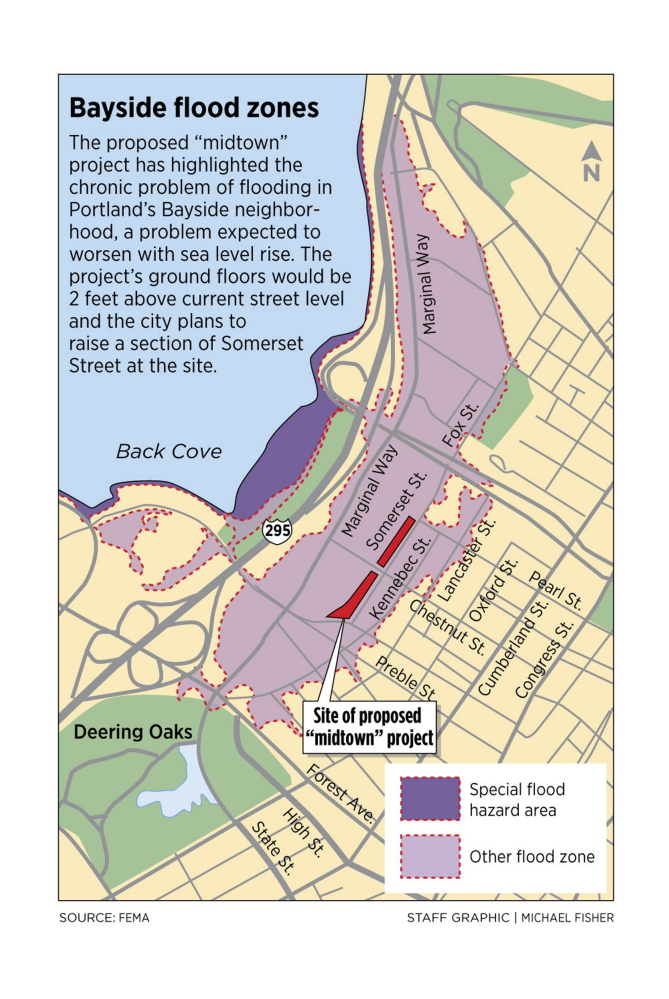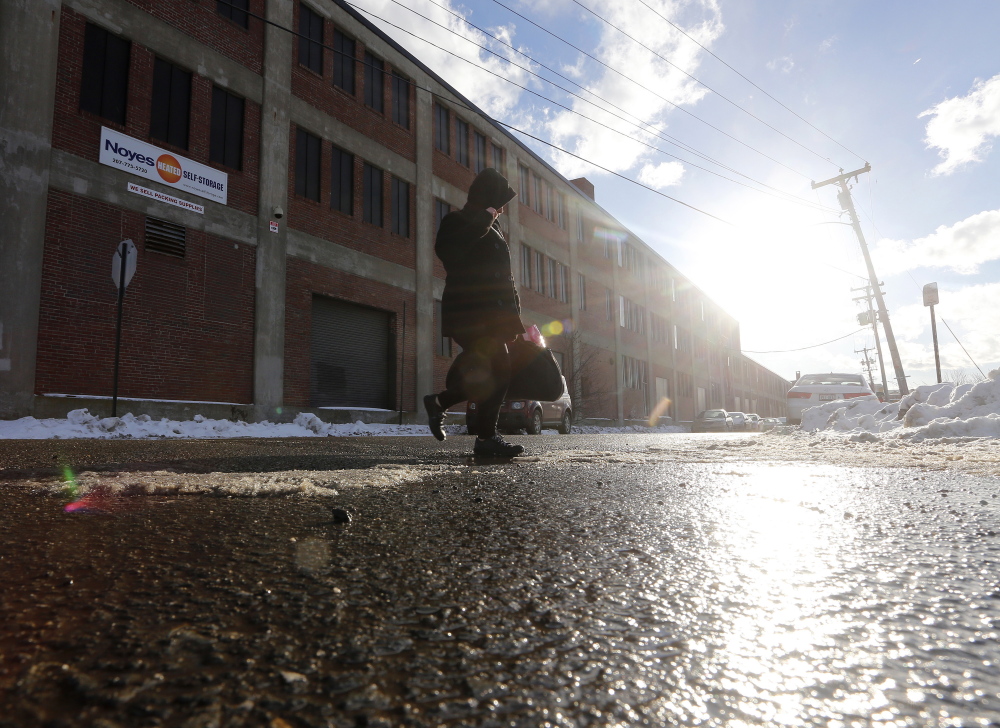A city vote on whether to approve the long-awaited “midtown” development in Portland’s Bayside neighborhood has been delayed again, allowing time for the developer and the city to address a snag over flooding concerns.
Portlanders have debated the pros and cons of the midtown project for years, partly because of its sheer size and partly because it would bring hundreds of new rental apartments to a housing market with virtually no vacancies for prospective renters.
The last-minute wrinkle facing the project has to do with plans by the city and developer to raise part of Somerset Street by 2 feet, and concerns about how that would affect a neighboring business. Raising the elevations of streets and buildings is an issue that will likely resurface whenever new developments are proposed in Bayside and East Bayside – two burgeoning neighborhoods with a history of flooding problems that will only get worse if sea levels rise and storms become more extreme because of climate change.
Portland’s Planning Board was scheduled to vote on the project Jan. 27, and the developer said this week the project would not survive further delays. But the meeting has been pushed back to Feb. 3 to give time for city staff to prepare. Meanwhile, the city and engineers for the Miami-based developer, The Federated Companies, are working to address the concerns of the owner of a nearby storage center about flooding problems that could arise from raising a city street in front of the project.
In conjunction with the current midtown proposal to build four six-story residential buildings in Bayside, the city wants to raise Somerset Street between Pearl and Elm streets by 2 feet – the same level as the ground floors of the proposed apartment buildings.
The owner of Noyes Self-Storage, situated between Kennebec and Somerset streets, worries that the raised street will cause water to pool by the base of the building, penetrate the old brick walls and flood the first floor, where half its business is located.
Jeff Levine, the city’s director of planning and urban development, said he’s optimistic that a resolution will be reached before the meeting Feb. 3. “I think we’re really close,” he said Friday.
John Bannon, the lawyer representing the Noyes family, said engineers are looking at how the project could be redesigned to prevent flooding, including the installation of catch basins or culverts. The building owner is “not yet convinced that they’re effective,” he said.
The cost of the street-raising project has been estimated at $4 million, with the city paying two-thirds of the cost and the developer covering the rest. City spokeswoman Jessica Grondin didn’t respond to a request for comment on whether the work being done would affect the cost or how much each party would pay.
Bannon said it was “too early to tell” if a solution to the problem could be reached before the meeting, but that it helped that the date was pushed back from Jan. 27.
“That gives us a little more time to work this out,” he said. “Noyes wants to be able to come to an agreement with the developer and with the city, if at all possible.”
MEETING DELAYED
Levine said the date of the meeting was pushed back because of the amount of material that planning staff had to review and put together for the board.
The project was initially proposed five years ago. It would be built on 3.25 acres of city-owned land in a former industrial neighborhood next to Interstate 295 that has been home to rail yards, scrap yards and warehouses.
The original plan included four 16-story apartment towers, two parking garages and ground floor retail space. It immediately faced strong resistance from those who said it was out of scale with the neighborhood and with the city’s downtown. That plan was approved last January, but became the subject of a lawsuit by a group called Keep Portland Livable, which argued that the massive project conflicted with the city’s long-term plans.
In a settlement reached in October, the developer agreed to drop the height of the four buildings by more than half, reduce the number of residential units from 650 to 445 and drop one of the two planned parking garages. The cost of the project also would be scaled back, from $105 million to an estimated $75 million.
The developers had hoped for swift approval, while city officials said the changes were significant and required further review.
On Tuesday, the Portland Press Herald quoted Jonathan Cox, the founder and chairman of The Federated Companies, the project’s developer, as saying the company was ready to scrap its plans if there were more delays.
“We want to make it abundantly clear to everyone that this is it,” Cox said. “If the Planning Board isn’t prepared to vote on Jan. 27, then we will withdraw.”
Cox said Friday that the company’s position was “misstated,” but declined to correct the record. He said, as a result of the story, the company has decided not to comment to the media until after the project receives approval.
Levine said the developer agreed to move the meeting to Feb. 3.
The last-minute negotiations over the raising of Somerset Street are not entirely a surprise.
The Noyes family expressed similar concerns before the previous proposal received approval and again Tuesday at a Planning Board workshop on the project. Levine said the meeting went well and the project is in a good position for next month’s vote.
However, he said, “I think we all recognize we’re not quite there with Somerset Street.”
Leslie Bridgers can be contacted at 791-6364 or at:
Twitter: lesliebridgers
Copy the Story LinkSend questions/comments to the editors.






Success. Please wait for the page to reload. If the page does not reload within 5 seconds, please refresh the page.
Enter your email and password to access comments.
Hi, to comment on stories you must . This profile is in addition to your subscription and website login.
Already have a commenting profile? .
Invalid username/password.
Please check your email to confirm and complete your registration.
Only subscribers are eligible to post comments. Please subscribe or login first for digital access. Here’s why.
Use the form below to reset your password. When you've submitted your account email, we will send an email with a reset code.